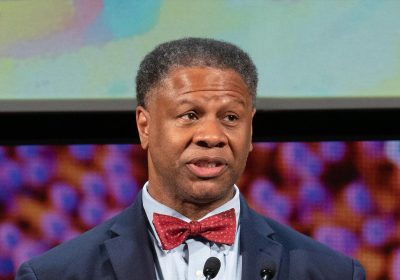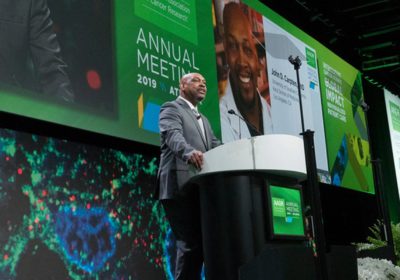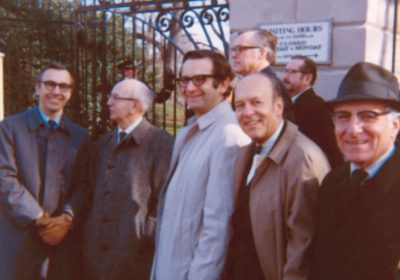AACR Grants and Awards
Funding Supports Gastric Cancer Research
After being diagnosed with stage IV stomach cancer in 2008, Debbie Zellman—a lawyer, wife, and mother of three—devoted her life to advancing treatment and care for patients. One year later, she started Debbie’s Dream Foundation: Curing Stomach Cancer (DDF). In 2014, the American Association for Cancer Research® (AACR) and DDF forged a partnership to support pioneering gastric cancer research.
The collaboration began with a Young Researcher Fellowship Program that offers $50,000 grants for researchers at the earliest stages of their careers—a time when they are looking to make an impact and, often, to honor their loved ones affected by cancer.
Ashleigh Poh, PhD, a researcher at the Olivia Newton-John Cancer Research Institute in Australia, became a cancer researcher after experiencing the devastating losses of her grandmother and aunt to cancer. With the fellowship money she received in 2018, Dr. Poh had the essential funding to investigate the role of hematopoietic cell kinase in gastric cancer.
Holly Martinson, PhD, who calls herself “one of the only cancer researchers in the state of Alaska,” used her 2016 grant to study gastric cancer in the Native Alaskan population. Dr. Martinson, a researcher at the University of Alaska, Anchorage, says her ultimate goal is to establish a cancer research center in the state.
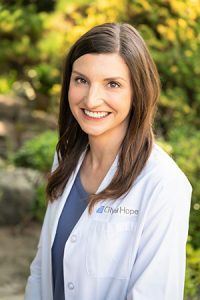
In 2016, the relationship between DDF and the AACR expanded to include career development awards for junior faculty to support their research on stomach cancer. Heather McGee, MD, PhD, a physician-scientist at City of Hope Comprehensive Cancer Center in Duarte, California, will use her 2023 award, totaling $200,000, to investigate how to enhance radiation’s ability to activate an anti-tumor immune response in gastric cancer.
In November 2023, DDF and the AACR launched the Innovation and Discovery Grant program to encourage innovation and translation of ideas from basic research to new treatment options. “This expansion reflects our collective belief in cutting-edge research’s power to propel gastric cancer science breakthroughs,” said Michael L. Ehren, president of the DDF Board of Directors. Inaugural grantees were Brent Hanks, MD, PhD; Ryan Moy, MD, PhD; and Eunyoung Choi, PhD, who received a Career Development Award in 2017.
Through the partnership, DDF has dedicated $1.45 million to support gastric cancer research. While Zellman died in December 2017, her legacy lives on in the work of scientists who are committed to unraveling the mysteries of gastric cancer and in the gastric cancer patients who will survive due to their research.
Ludwig Foundation Funds AACR Scholar-in-Training Awards
Daniel K. Ludwig was among the world’s wealthiest business leaders in 1971 when he made a momentous decision. He would allocate nearly all of his international holdings to support President Richard Nixon’s recently declared War on Cancer by establishing the Ludwig Institute for Cancer Research.
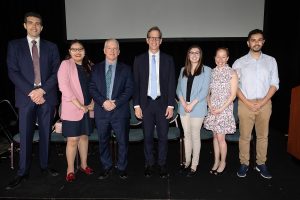
Photo ©2023 AACR/Todd Buchanan
Following the principle that tackling cancer requires the best minds operating in the most favorable conditions, Ludwig Cancer Research encompasses an international community of distinguished scientists, six endowed Ludwig Centers at leading U.S. institutions, and the Ludwig Institute, which conducts its own research and clinical trials. The American Association for Cancer Research (AACR) has partnered with Ludwig Cancer Research through the years, and in 2023, the collaboration included funding for six AACR Scholar-in-Training Awards.
Thanks to the award, Álvaro Curiel García, PhD, of Columbia University Irving Medical Center in New York City, was able to attend the AACR Annual Meeting 2023 in April in Orlando, Florida. Based on several personal experiences when he was younger, Dr. Garcia believes that one needs to “understand a disease in order to treat it.” Drawn to the field of pancreatic cancer research, “known for its formidable complexity and the difficulties in finding effective treatments,” Dr. Garcia studies the heterogeneity and malignancy of tumor cells through systems biology tools and lab experiments.
The Scholar-in-Training Award allowed him to present his work on novel drivers of pancreatic ductal adenocarcinoma and learn from others about recent advances in cancer research. “Attending the AACR Annual Meeting is a great opportunity to expand your network, discover new advances in cancer research, and establish collaborations with other groups from anywhere,” he said.
Jonathan Downie, MD, PhD, of Harvard Medical School/Massachusetts General Hospital in Boston, another Scholar-in-Training awardee, presented research at the AACR Annual Meeting 2023 on the preventive effects of aspirin on colorectal cancer. “The adoption of aspirin as a preventive agent has been limited by an incomplete understanding of aspirin’s mode of actions in humans,” Dr. Downie said. In his research, he attempted to understand that mode of action and discovered that aspirin resulted in cell composition changes in the colon’s epithelium, or lining, that could contribute to its preventive effect. “I hope to advance the field of gastrointestinal cancer prevention through novel insights into aspirin chemoprevention,” Dr. Downie said. “By attending the 2023 AACR Annual Meeting, I had the opportunity to share my research with the scientific community and learn about the newest advances in cancer prevention research.”
Related Posts
